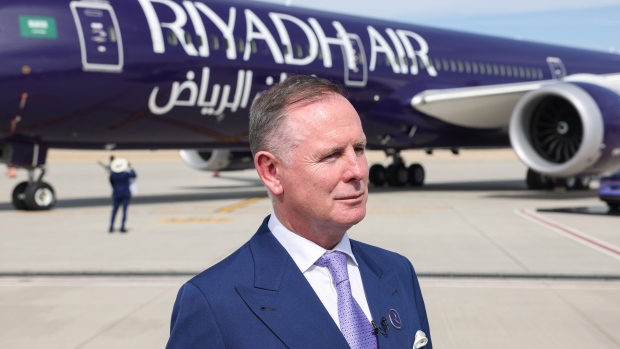Riyadh Air's Bold Move to Elevate Saudi Skies
Amidst an ambitious economic transformation, Saudi Arabia's Riyadh Air is making waves with strategic fleet expansions and operational launches poised for 2025.
Published May 07, 2024 - 00:05am

Image recovered from bnnbloomberg.ca
RIYADH: Saudi Arabia is positioning itself as a key player in the aviation industry with the upcoming launch of its second flag carrier, Riyadh Air, escalating competition with regional airlines. Riyadh Air, backed by the Public Investment Fund, is expanding its fleet with substantial aircraft orders, a strategic move aligned with Saudi Arabia's vision to diversify its economy and enhance its aviation sector.
The enterprise, led by CEO Tony Douglas, is taking aggressive steps to scale up operations, evidencing the commitment with past orders of 39 Boeing 787-9 jets and options for an additional 33. With plans to commence flights by June 2025, Riyadh Air targets major international hubs, challenging existing carriers and addressing the Kingdom's connectivity ambitions.
Underpinning this expansion is the goal to reduce reliance on pilgrimage travel and attract a broader spectrum of tourists. Riyadh Air's launch is a testament to Saudi Arabia's growing economy and surging tourism, with a clear strategy to achieve organic growth rather than through mergers and acquisitions.
Former Etihad Airways chief Tony Douglas emphasizes the necessity for a large fleet to compete against established airlines. The plans include narrowbody and widebody aircraft orders, although concerns over production delays at Boeing and Airbus due to global supply chain constraints are acknowledged. The airline's approach is influenced by the wider aspiration to bolster Riyadh as a global aviation hub and to contribute to Saudi Arabia's evolving tourism landscape.
The future of Riyadh Air is being closely watched as it aims to connect over 100 destinations by 2030, marking a significant milestone for the business landscape of the Middle East. Meanwhile, other regional carriers like Etihad are also planning to increase their fleet size, potentially creating a competitive yet dynamic market.
The inception of Riyadh Air is a component of a larger transformation within Saudi Arabia, as outlined by Vision 2030, an ambitious reform plan aiming to diversify the country's economy beyond oil. The new airline is viewed as pivotal to developing tourism and entertainment industries, sectors poised for significant investment under the plan. These developments showcase Saudi Arabia's efforts to reform its economic foundations and enhance its standing in the global market.
Moreover, Riyadh Air is expected to provide a significant boost to the Kingdom's job market. Job creation is an integral part of Vision 2030, and the airline industry is a substantial contributor to employment opportunities. Riyadh Air will not only employ pilots, cabin crew, and ground staff but will also stimulate job growth within auxiliary sectors like airport operations, maintenance, catering, and tourism services. This multifaceted approach to development encapsulates the Kingdom's broader economic objectives.
Behind Riyadh Air's strategy is a synergy with the country's expanding aviation infrastructure. New airport projects and expansions, such as the King Khalid International Airport in Riyadh, are underway to accommodate the expected surge in air travel. The collaboration between the airline and airport developments aims to ensure that the infrastructure can support the airline's growth while offering passengers a modern and efficient travel experience.
The Kingdom's strategic geographic location positions Riyadh Air advantageously to capitalize on the travel demands of not only the Middle East but also Africa, Asia, and Europe. The ambition to establish Riyadh as a linchpin in the global aviation network is highlighted by the airline's target destination network. It also aligns with the country's aim to increase its share of international transit flights, which is part of the broader economic diversification efforts.
Environmental consciousness and sustainability are also critical aspects of Riyadh Air's operational framework. The selection of Boeing 787-9 jets, known for their fuel efficiency and lower emissions, indicates the airline's commitment to sustainable practices. This focus is aligned with global aviation trends which emphasize ecological operations and the reduction of the carbon footprint.
In the continuously evolving air travel industry, the entry of Riyadh Air presents potential shifts in airline alliances and partnerships. Established regional carriers may face new alliance dynamics as Riyadh Air seeks to position itself among the ranks of its peers. These relationships will be crucial to Riyadh Air's global connectivity goals and are expected to influence the commercial landscape of international air travel.
As Riyadh Air aims for takeoff within the next couple of years, its emergence resonates with the wider economic and tourist ambitions of Saudi Arabia. With the Kingdom moving swiftly to expand its global influence through investments and development in various sectors, Riyadh Air is set to become a symbol of this new phase of economic and industrial prowess.







